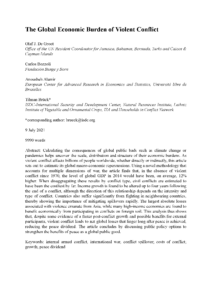FAO Syria is implementing the “Smallholder Support Programme” (SSP). The main objective of this programme is to contribute to the transformation of the agriculture sector in Syria by empowering vulnerable smallholder farmers and livestock keepers to be more productive, efficient and profitable as well as more informed, self-organised and risk aware. Two year after programme […]
Read More
Political violence is a major impediment to economic development, damaging social, physical and human capital. By contrast, the manner in which violence influences prosocial behaviors is less clear cut, even though these behaviors likely contribute to post-conflict outcomes at individual and aggregate levels. We propose that the standard routes through which the experience of violence […]
Read More
We survey efforts that track food security in Africa using phone surveys during the COVID-19 pandemic. Phone surveys are concentrated in a few countries mostly focusing on a narrow theme. Only a few allow heterogeneous analyses across socioeconomic, spatial, and intertemporal dimensions across countries, leaving important issues inadequately enumerated. We recommend that the scientific community […]
Read More
The COVID-19 pandemic is a global crisis affecting everyone. Yet, its challenges and countermeasures vary significantly over time and space. Individual experiences of the pandemic are highly heterogeneous and its impacts span and interlink multiple dimensions, such as health, economic, social and political impacts. Therefore,there is a need to disaggregate “the pandemic”: analysing experiences, behaviours […]
Read More
Governments worldwide have been responding to the spread of the COVID-19 pandemic with various lockdown measures. These restrictions can have positive effects on curbing the spread of the virus but may also cause serious economic challenges. Evidence on how the severity of lockdown policies impact the well-being of households in low- and middle-income countries over […]
Read More
In fragile and conflict-affected places, it can be difficult to successfully build or improve livelihoods through jobs-based programming. Yet, in many fragile places, some programmes are not only tasked with delivering on these outcomes but also with changing and improving the attitudes, perceptions, beliefs or behaviours of their participants, particularly towards the societies in which […]
Read More
How does ethnic inequality shape victimization in violent conflicts? Our case study of the 2010 conflict in Kyrgyzstan tests whether communities with higher ethnic inequalities in education experienced more intense displacement. We find that local inequality in education between Kyrgyzstan’s ethnic majority and its largest minority robustly predicts patterns of forced displacement, controlling for alternative […]
Read More
It has been shown consistently in the literature that early life exposure to extreme weather events affects children’s nutritional status and related long-term health and well-being outcomes. The effects of weather shocks other than rainfall, as well as heterogeneous effects among population subgroups and moderators of this relationship, however, are less well understood. By combining […]
Read More
Definitions of fragility are focused at the level of the state, but this should not be considered to suggest that individuals with heterogeneous endowments experience a state of fragility in the same way. Nor does it suggest that all subregions of a fragile country exist in this state. In turn, experience of fragility varies not […]
Read More
Calculating the consequences of global public bads such as climate change or pandemics helps uncover the scale, distribution and structure of their economic burdens. As violent conflict affects billions of people worldwide, whether directly or indirectly, this article sets out to estimate its global macroeconomic repercussions. Using a novel methodology that accounts for multiple dimensions […]
Read More



